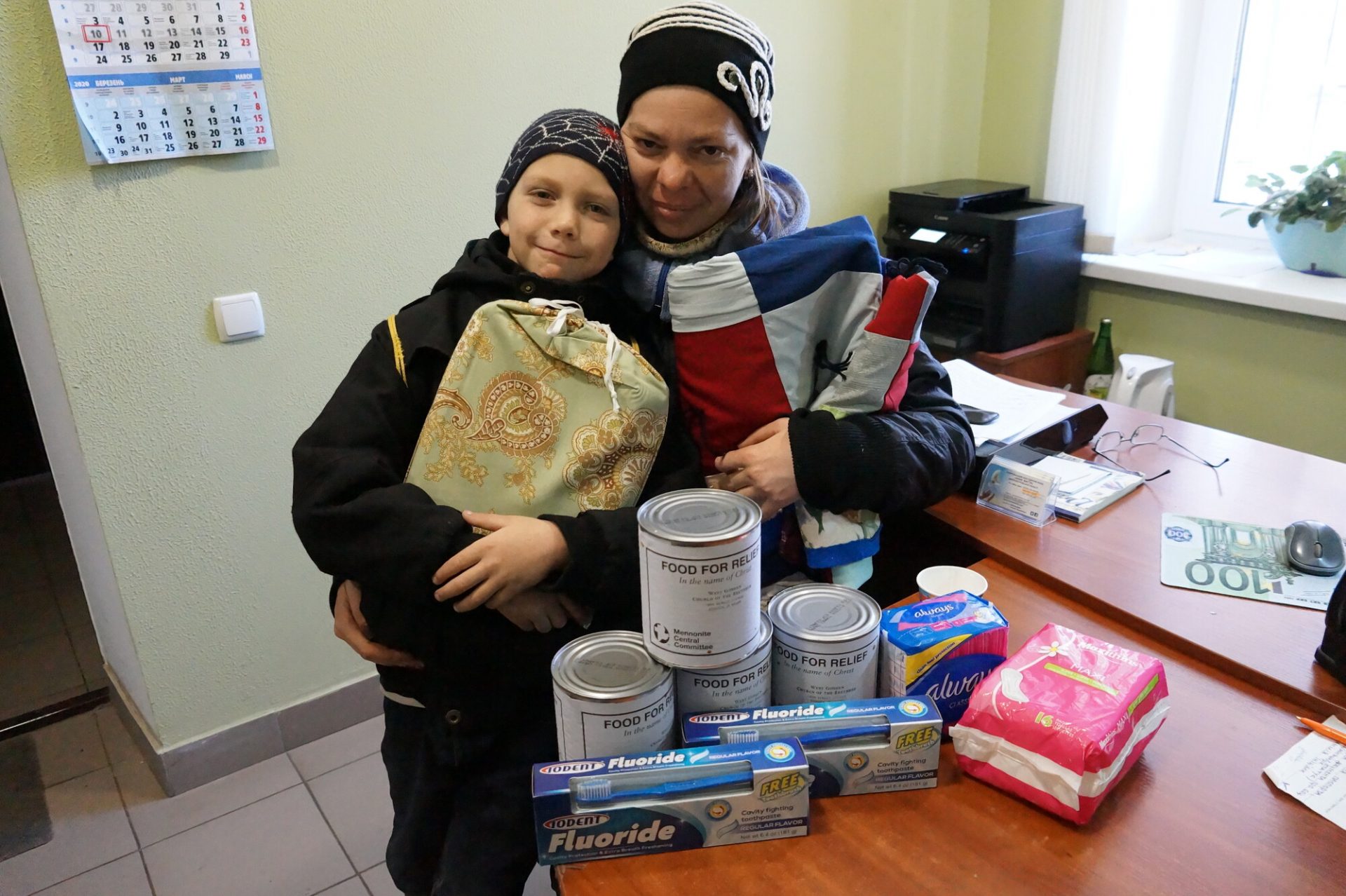Much of Ukraine is currently a war zone after Russia invaded last Thursday. The Mennonite Central Committee (MCC) has partner organizations in the country and staff based in the eastern city of Zaporizhzhia. On Thursday, the mayor of a nearby town reported that Russian troops were advancing on the Zaporizhzhia nuclear power plant. MCC Canada executive director Rick Cober Bauman spoke to Broadview’s digital editor, Emma Prestwich, on Tuesday about the situation and the response that MCC would like to see from the Canadian government.
Emma Prestwich: What is the Mennonite Central Committee’s connection to Ukraine?
Rick Cober Bauman: MCC was born in Ukraine just a little over 100 years ago. And it was not an entirely dissimilar situation. This was during the Bolshevik Revolution, and a lot of families fled that violence. We haven’t worked there continuously since then, but we have been there again for several decades. Our work is based in the east, in Zaporizhzhia.
And there are about 15 or 16 partner organizations that we work with in Ukraine. Some of them are connected to the Mennonite church there and others are community-based partnerships.
EP: What do you know about the situation for staff?
RCB: We actually moved non-Ukrainian staff out of the area in February, and now our Ukrainian staff and their families are making a variety of decisions about sheltering in place, moving elsewhere in Ukraine, or perhaps crossing the border into neighbouring countries.
EP: What is the situation they’re facing right now?
RCB: I’m looking at the text of a podcast [with] Maxym Oliferovski, the head of one of the partner organizations called New Hope. It’s associated with the Mennonite Brethren Church. He’s talking about what it was like the first night and hearing the explosions, feeling the ground shake, but choosing to stay and continuing to try to provide some humanitarian relief. He’s in Zaporizhzhia.
Interested in more stories like this? Subscribe to Broadview’s weekly newsletter.
EP: Can you share some of his interview?
RCB: He says, “We decided to stay in Zaporizhzhia as long as it’s possible. We don’t have young kids anymore… how can we help our families? Our neighbours? Our church members?… So we purchased some food ahead of time, and we made up food kits…. On the first day, we distributed the food kits because we didn’t know how long the stores would be open. And, yeah, first day, huge lines at gas stations, ATMs, grocery stores … Everybody in Ukraine is certainly experiencing trauma.”
EP: Has the fighting made it to Zaporizhzhia?
RCB: There has been some shelling there, according to Max. It is a fairly major city, but it hasn’t been as heavily hit as the capital and a couple of other strategic cities. Still, it’s not considered safe, so lots of people have left.
EP: For the staff still there, what kind of humanitarian work are they able to do?
RCB: I asked a colleague earlier today: “Are our partners actually able to function? Are they just looking out for their lives and the lives of their families?” And she told me that they’re not operational in the sense of previous routines, but many have at least a few staff responding to the needs of people who are trapped in their homes, or, who are out on the roads.
EP: How have Canadians responded?
RCB: The generous response so far from Canadians is just remarkable. Lots of our Mennonite Central Committee constituency have their roots in Ukraine. Their ancestors fled Ukraine during the revolution in 1920 when MCC began. So there are a lot of people who really feel an affinity for Ukraine and for what is still, in some ways, a homeland. We are going to be able to make a very significant response to Ukraine. But exactly how that’s going to happen, on what timeline, and through which partners, [we don’t know yet]. There’s just way too many unknowns.
More on Broadview:
- Berlin’s radical renter movement has lessons for Canada’s big cities
- Mennonite minister tweets perfect response to freedom convoy
- She was part of Saddam Hussein’s inner circle. Now she wants to help heal others.
EP: What would MCC like to see Canada doing right now in response to the situation?
RCB: We do all of our relief and development work through a peace-building lens. We’ll be communicating this week with our federal government and asking them to put their support behind all the diplomatic and non-military solutions that are possible.
EP: The Canadian government is providing military support to Ukraine. What do you think about that?
RCB: We would say that violence doesn’t actually build a lasting peace. Lasting peace is built at the negotiating table, and that’s where we need all parties to be. We recognize that these are really unusual circumstances with this kind of almost 19th-century style of brutal invasion, which we haven’t seen in Europe for so many decades. But we continue to be a peace-building organization that’s rooted in a historic peace church. So that’s definitely going to continue to shape our advocacy here.
EP: What can Canadians do to help?
RCB: We invite people to advocate for [peaceful negotiations] as well. And we ask people to make financial gifts for the evolving response that I was talking about earlier. We expect that this is going to be a major humanitarian response. And we ask people to remember their brothers and sisters in prayer and to pray also for our dear brother, Mr. Putin, that his heart of conquest might be softened.
***
Emma Prestwich is Broadview’s digital editor. This interview has been condensed and edited for clarity.
We hope you found this Broadview article engaging.
Our team is working hard to bring you more independent, award-winning journalism. But Broadview is a nonprofit and these are tough times for magazines. Please consider supporting our work. There are a number of ways to do so:
- Subscribe to our magazine and you’ll receive intelligent, timely stories and perspectives delivered to your home 8 times a year.
- Donate to our Friends Fund.
- Give the gift of Broadview to someone special in your life and make a difference!
Thank you for being such wonderful readers.
Jocelyn Bell
Editor/Publisher


Comments
WGN says:
There are more Christian responses to war than mennonite pacifism. Hope the magazine will cover just war. Because it seems to me to have merit in the present war Europe is in right now. An oversimplification if someone breaks into your house do you have the moral right to defend your family?
Sheldon LeGrow says:
"Lasting peace is built at the negotiating table." It's a wonderful thought but it makes an assumption that can be deadly. It assumes that the two parties actually want peace and it assumes that both parties are reasonable and civilized. This has not been the case since Biblical times. If a person wants to break into my house I am not going to negotiate as to what part of the house he/she can have. The house is mine and an intruder is not welcome and it is my responsibility to defend my property and my loved ones. Religion and spirituality are good when living with civilized people but when dealing with the Hitlers and Putins of the world, the only thing they knew and know is force....and not just an equal amount of force because that just gives them time to regroup, but overwhelming force.
Sheldon LeGrow says:
Never ever give in to an aggressor who wants to take what you own. Religion and spirituality only work against reasonable civilized individuals. We must defend ourselves decisively against those who want to make slaves of us.
Replies
gary says:
Whatever you have is not yours, it's God's. You may need to be a good steward, but what is taken wasn't yours. 1 Corinthians 4:7
Your thought didn't work out too well with the Israelites in the OT.
Religion and spirituality also works with uncivilized people as well. Modern liberal theologians tell me this all the time.